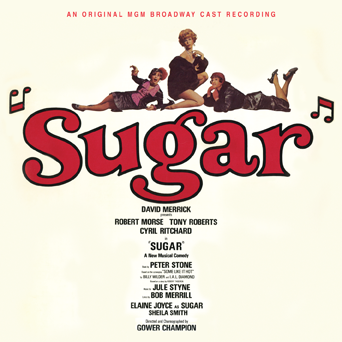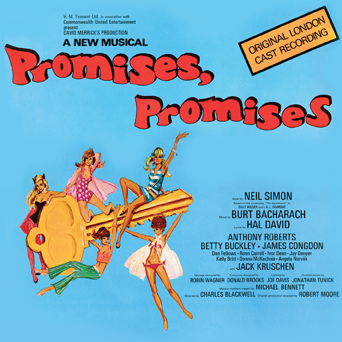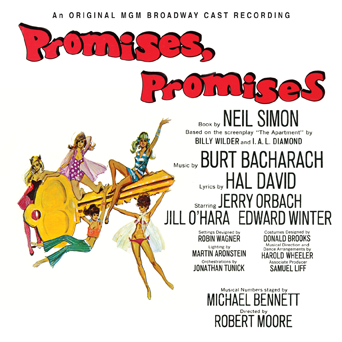Lo and behold, Bruce Kimmel has done it again. It seems every few weeks he’s going to push me further and further into the poor house with one of his now-essential limited edition cast album releases. This year has brought forth two different recordings of Promises, Promises and now his label Kritzerland has reissued the long out-of-print Sugar, the 1972 musical adaptation of the all-time classic Some Like It Hot. I first heard the score about six years ago, just as a good friend of mine was preparing to audition for the show at his college.
Some Like It Hot is one of the funniest movies ever made, with three iconic performances from Jack Lemmon, Tony Curtis and an endearingly blowsy Marilyn Monroe under the superb direction of Billy Wilder. Comedian Joe E. Brown got one of his most famous roles – and one of the most famous last lines in film history – as the ultra wealthy, mother-worshiping Osgood Fielding, Jr. who sets his sights on Lemmon’s character. It ranks #1 on the AFI’s list of all-time comedies and is one of those rare films that only gets funnier and funnier with repeat viewings. A musical version was not much of a surprise; producer David Merrick was already responsible for smash hit Promises, Promises based on Wilder’s The Apartment.
However, the critical response wasn’t as enthusiastic for Sugar. There were troubles out of town and there were constant changes being made. But there was some bad blood between composer Jule Styne, lyricist Bob Merrill and director-choreographer Gower Champion (who were all fresh from the out-of-town failure Prettybelle). The show did, however, play well to audiences and managed a respectable 505 performance run, turning a modest profit. The show made its London premiere in 1992 starring Tommy Steele, revised and reverted back to the film’s title. Most recently, a 2002 national tour went out with Tony Curtis graduating into the Joe E. Brown role.
The score isn’t on par with Gypsy, or even for that matter, Subways Are for Sleeping or Darling of the Day. But even lesser Jule Styne is better than most – it’s ripe with fun, tuneful melodies that speak to old-school musical comedy. Ultimately, I don’t think a musical adaptation was particularly necessary – how can you improve on a popular classic? But that doesn’t mean the album doesn’t make for a fun listen. Things gets off to a marvelous start with a smashing overture, an amusing opener “Penniless Bums” and a rip-roarin’ burlesque showstopper “The Beauty That Drives Men Mad,” in which the duo make their first appearance in their alter ego drag. Robert Morse, from all reports, offered a comic tour de force onstage (in the Lemmon role) that folks still recall fondly. He registers best, particularly his half of the genial “We Could Be Close” (he does get some of the best lyrics).
Tony Roberts (stepping into the Curtis role) had some of the more serious and less memorable musical moments, including the ballad “It’s Always Love,” which to me feels like it was interpolated from another musical entirely. Elaine Joyce is pleasant, but has the unenviable task of trying to live up to Monroe’s legacy and cannot. Cyril Ritchard takes on the Joe E. Brown role of Osgood Fielding, Jr. His duet with Morse is hilarious. Sheila Smith, a reliable standby for Angela Lansbury (Mame), Elaine Stritch (Company) and several principle roles in Follies, has the opportunity to step into the limelight as the female bandleader.
The CD was original released by Rykodisc around the same time of the first CD release of Promise, Promises with similar aural deficiencies. The new release is another 2-disc special edition. The first disc is for purists, a cleaned up release of the original album mix. The second disc offers a remixed edition, bringing greater clarity to the performances, bringing out undiscovered colors in Phil Lang’s superb orchestration and bringing down the excessive reverb that was one of album producer Mitch Miller’s trademarks. (Speaking of Miller, don’t stop playing the second disc after the finale…there’s a surprise). The result is stunning. While I’ve known the score for five years, in a way it was like hearing it for the first time. Kimmel has written the accompanying liner notes, which delve into the show’s transition from screen to stage.
I’m always curious to hear Kimmel will bring out next. Almost all of the recent cast albums he has issued were originally United Artists record releases (now owned by MGM Records) and most are on CD for the first time. The original cast recording seems to become more and more of a niche market with each passing day. The sales of cast albums and the expense to produce them these days make it a risky endeavor. Some shows will recoup the costs, many don’t. Interest in many of the lost shows seems to be waning as avid collectors and show music enthusiasts seem to be disappearing. As someone who collects every show album I can get my hands on, I am always grateful when a new show gets recorded, but now I’m even more grateful when someone like Kimmel takes the initiative to bring out a show that has fallen into obscurity. (I do hope that he is able to release A Time for Singing).





